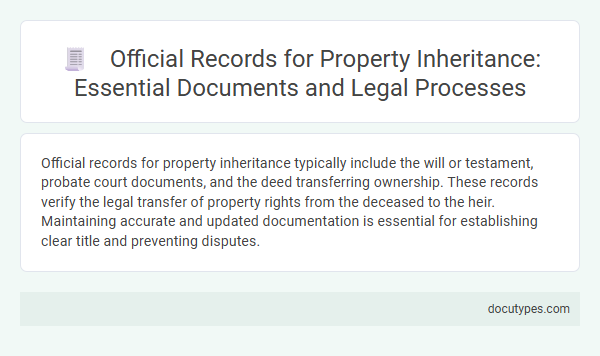Official records for property inheritance typically include the will or testament, probate court documents, and the deed transferring ownership. These records verify the legal transfer of property rights from the deceased to the heir. Maintaining accurate and updated documentation is essential for establishing clear title and preventing disputes.
Understanding Official Records in Property Inheritance
Official records for property inheritance include wills, probate court documents, and property deeds. These records validate the transfer of property ownership from the deceased to heirs. Understanding these documents is crucial for verifying legal property claims and resolving inheritance disputes.
Key Legal Documents Required for Property Inheritance
Official records for property inheritance are essential legal documents that validate the transfer of property ownership after a person's death. These records ensure the rightful heirs receive the inherited property in accordance with the law.
Key legal documents required for property inheritance include the original will, probate court orders, and the death certificate of the deceased. The will outlines the deceased's wishes regarding property distribution, while probate court orders confirm the validation of the will or appointment of an administrator. The death certificate serves as proof of the owner's passing, which initiates the inheritance process.
Importance of the Will in Inheritance Proceedings
Official records for property inheritance are essential documents that verify the legal transfer of property ownership after an individual's death. The will plays a crucial role in inheritance proceedings by outlining the deceased's wishes and guiding the distribution of assets.
- Legal Authority - The will serves as the primary legal document that grants executors the authority to manage and distribute the property according to the deceased's instructions.
- Proof of Intent - It provides clear evidence of the deceased's intent, reducing disputes among heirs and expediting the probate process.
- Your Protection - Having a valid will ensures your property is inherited by your chosen beneficiaries, safeguarding your legacy and minimizing legal challenges.
Succession Certificate: Definition and Application Process
Succession certificate is an official legal document issued by a court that authorizes the legal heirs to inherit the movable property of a deceased person. It plays a crucial role in establishing the rightful claimant to debts, securities, and financial assets left behind by the deceased.
The application process for obtaining a succession certificate involves filing a petition in the appropriate civil court with jurisdiction over the deceased's last residence. The court examines the claim, publishes a public notice inviting objections, and after due verification, issues the succession certificate to the legitimate heirs.
Role of Legal Heirs Certificate
Official records for property inheritance include various legal documents that establish rightful ownership and transfer of assets. The Legal Heirs Certificate plays a crucial role in certifying the legitimate successors entitled to inherit the property.
- Legal Heirs Certificate - This certificate formally identifies individuals who have legal rights to inherit property from a deceased person.
- Succession Certificate - Used primarily to claim debts and securities of the deceased, it complements the inheritance process.
- Property Title Deed - The deed is updated to reflect the transfer of ownership from the deceased to the legal heirs certified by the Legal Heirs Certificate.
Mutation of Property: Process and Significance
Official records for property inheritance primarily include mutation certificates, wills, and succession certificates. These documents validate the rightful transfer of property ownership from the deceased to the legal heirs.
Mutation of property is the process of updating land revenue records to reflect the change in ownership after inheritance. This process is significant as it establishes legal ownership, enabling heirs to pay property taxes and sell or transfer the property in the future.
Probate Process and Its Necessity
What are the official records required for property inheritance during the probate process? The probate process involves validating a will and officially transferring property ownership to heirs. These records include the will, death certificate, and court orders confirming the transfer of assets.
Why is the probate process necessary for property inheritance? Probate ensures the legal distribution of the deceased's property, protecting your rights and those of other heirs. It also resolves any disputes and clears outstanding debts before property transfer.
Court Orders and Their Impact on Property Transfer
| Official Records for Property Inheritance | Description |
|---|---|
| Probate Court Orders | Legal documents issued by probate courts that authorize the transfer of property ownership following a deceased individual's will or, in the absence of a will, under intestacy laws. |
| Letters Testamentary and Letters of Administration | Courts issue these documents to grant executors or administrators the authority to manage and distribute the deceased's estate, including real property. |
| Judgments and Decrees | Court decisions confirming rightful heirs and resolving disputes related to property inheritance, often required to update property records and facilitate legal transfer. |
| Impact of Court Orders on Property Transfer | Court orders validate the legal ownership transfer by providing official authorization recognized by land registries, lenders, and title companies, ensuring clear title and preventing future inheritance claims. |
| Recording with County Recorder's Office | Copies of court orders related to inheritance must be recorded in the local property records to formally document the transfer and update ownership information. |
Common Challenges in Accessing Inheritance Documents
Accessing official records for property inheritance involves navigating various legal and administrative procedures. These records include wills, probate documents, and land titles essential for proving rightful ownership.
- Complex Legal Terminology - Inheritance documents often contain specialized language that can be difficult for non-experts to understand.
- Restricted Access - Some records may require court permission or proof of relationship to the deceased to be accessed.
- Incomplete or Missing Records - Older properties might have incomplete documentation due to lost or damaged records over time.
Understanding these challenges helps in preparing for the legal steps necessary to claim inherited property.
What Are the Official Records for Property Inheritance? Infographic

